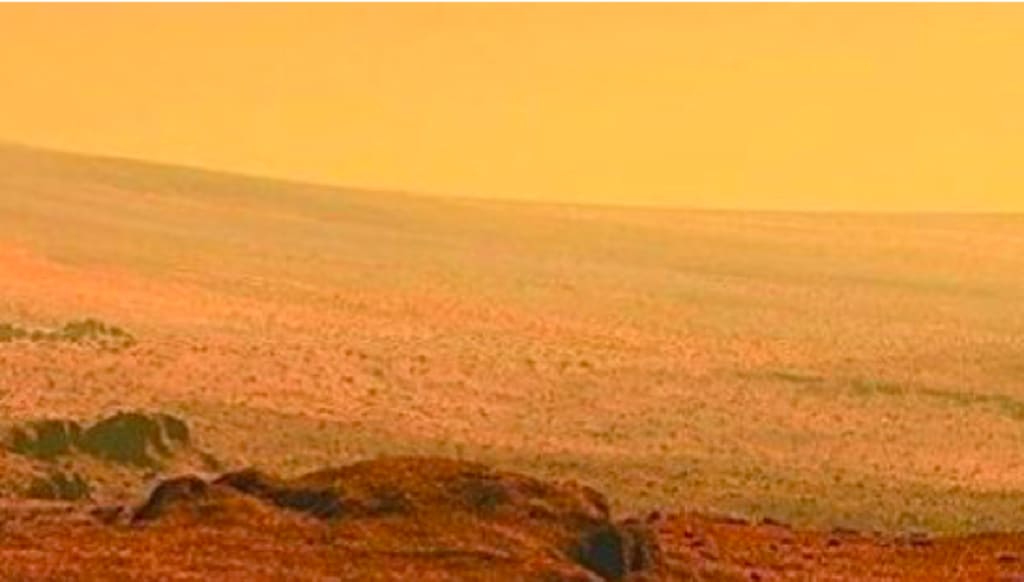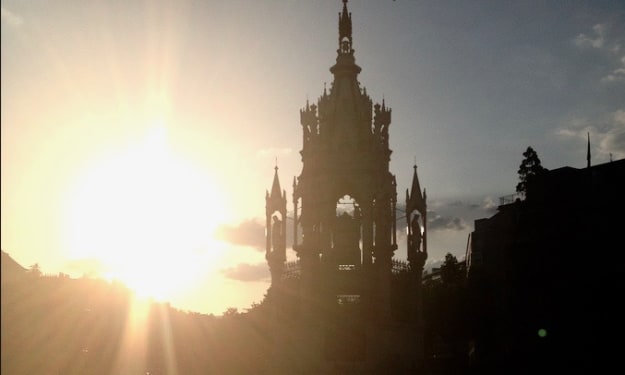Red Sands
Curiosity about the past is common to all peoples...

Red sands, thin sky, dusty hands, tired eyes.
The travellers move through the strange landscape; they are weary and home is too far away to bear thinking about without a shadow falling across the soul, so instead they choose to lose themselves in the stark and barren beauty of their surroundings.
No living thing has set foot here in a long time, this they know.
Look! One has fallen behind. He stops and pulls off a glove; then stoops and places a palm on the warm ground; the endless shift of sifted silt plays across the back of his hand like so many little rusty ghosts.
His thoughts flick unbidden to his home. There is no sand there. Plenty of ghosts, but no sand.
The others have not broken their pace, so he stands and runs to catch up, kicking up little dust clouds behind him, which whirl and coil into small spiralled shapes in the silent wind. His glove slips from his fingers and, caught by the air currents, it whirls into the dusk behind him and is lost. He either does not notice, or does not care.
He reaches the group again at the crest of a ridge of red sand and rubble, where they have stopped to look down into a wide valley. Seven silhouettes pause for a moment on the ridge, atrate and sharp eyed. They have arrived. He smiles and they begin their descent. The ground is steep and treacherous here and they slip down the slope, balanced precariously and occasionally reaching out for each other’s arms with flailing hands as the sand moves beneath their worn boots. They laugh quietly at each other’s inelegance.
At the bottom of the valley, sheltered from the harsh winds of the plains above, are some piles of rubble whose rough yet even spacing suggest that they were not formed naturally; this is why they are here: the signs that this place was once lived in by people- and perhaps they live here still, somewhere. This is the hope, though it is slim and peppered with the doubt of a hundred other times when a pile of rocks has turned out to be just a pile of rocks. They are beginning to think that there is no one else out here. But still they hope.
And perhaps not in vain, not this time.
The traveller wearing only one glove stoops again, and tugs at something protruding from the sand.
“Canvass,” he says quietly.
There is another ripple of excitement. Canvass is definitely not naturally occurring. They have found it: a place where other people once were.
They set up a small camp at a distance from the rubble, and over the next few days they begin to excavate; gently, reverently, they form a picture of what these people were like. Did they live here for long? Were they many, or few? Did they come from this place, or were they, like us, just travellers passing through?
Which begs another question: if they did not come from here, then where?
The travellers sift sand and brush particle-fine samples from the rubble; their hands are deft and their eyes are sharp; they are good at what they do, lightly treading back and forth across the tightrope-line between learning and preserving.
-
During the day, copper sands skitter over their tents, and the red skies shade their faces strangely. At night, they huddle against the cold, their pupils wide and black in the face of the lightless deserts.
The man with one glove lies in bed and listens to the wind howl, straining his ears for other sounds; anything that suggests that other people might be out there. They are not lonely. Not as such. They have each other, and the knowledge that one day they will return home to the rest of their people. But it would be nice to know that their travels have not been futile.
He watches the stars and tries not to think of home.
“Sometimes I think I hear them,” says one of his companions, as they lie awake one night.
“The people back home?” he asks.
“The stars,” she answers. “They look so much like they should be singing; sometimes I think I can hear their songs.”
“What do they sound like?” he asks, deciding against making fun of her.
“Whispers,” she says sleepily. “Pin drops. Feathers. Psithurisms”
He smiles, equally tired. “That’s the day we know we’ve cracked. When we know it’s time to turn for home.” He yawns. “The day we hear the stars singing.”
-
They have been there a few weeks before finally they are finished. Questions have been answered and have in turn given birth to exponentially more questions: it is clear now that these structures have been abandoned for many thousands, perhaps tens-of-thousands of years. They are disappointed, but find hope in the realisation that these people could barely breathe this air or weather this climate (as evidenced by the skeletal remains of airlock doors and strange life-support machines), and thus must have come from another place altogether.
So they pack and turn their gaze upon the next most innermost planet of this system; a small, hot, blueish-green orb. They had dismissed it previously, on account of the toxicity of its atmosphere. But perhaps it holds more clues to the origins of this ancient civilization.
The travellers leave nothing behind but footprints and breath and a little black glove, cartwheeling on the wind.
Black skies, old scars, sharp eyes, singing stars.
About the Creator
Jackson Howling
Supposed to be studying for an engineering degree. But words are fun too. They keep escaping. So I thought I'd put them here. Favourite words: silver, Juarez, psithurism, twit.






Comments
There are no comments for this story
Be the first to respond and start the conversation.